How do individuals, parties and the media participate in elections?
Quick version
Individuals can participate in elections by:
- voting - anyone aged 16 or over can vote in elections to the Scottish Parliament and local councils in Scotland
- staying informed - being aware of issues helps people decide who to vote for
- supporting a candidate - displaying posters, delivering leaflets and canvassing door-to-door
- standing as a candidate - people can stand as a party candidate or independent candidate
Political parties can participate in elections by:
- producing a manifesto - a manifesto outlines policies and plans for government, letting people know what they are voting for
- campaigning - canvassing, leafleting and holding public meetings and events help a party spread its message
- engaging with the media - coverage on TV, radio, social media and newspapers help parties reach the wider public
Media can participate in elections by:
- informing - telling voters about parties and issues, and covering events of the election and campaigns themselves
- holding to account - questioning candidates and parties on their policies and ability to deliver
- influence
- TV and radio must remain neutral
- newspapers and social media can take political sides and attempt to sway how people vote
Learn in more depth
How can individuals participate in elections?
How can individuals participate by voting in elections?
Most individuals participate in elections by voting.
Everyone aged 16 years or over can take part in Scottish Parliament and local council elections.
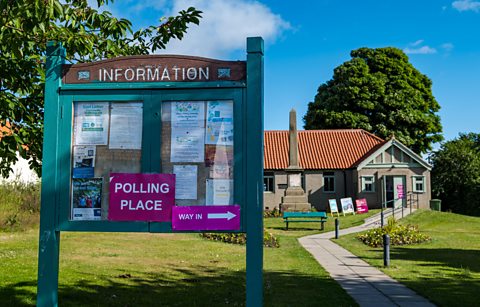 Image source, Sally Anderson News / Alamy
Image source, Sally Anderson News / AlamyTo take part voters need to:
- make sure that they are on the Electoral Register
- register for a postal vote or proxy vote if they will not be able to vote in person
- visit their local poling station to cast their vote on the day of the election
People can choose who to vote for many reasons:
- they support a particular party
- they like a particular candidate
- they feel strongly about a particular issue (this could be local or national)
- they vote tactically to prevent a particular candidate or party from being elected
Some people do not vote:
- they may not be interested in politics
- they don't feel informed about issues
- they are tired of politics
- they don't feel they can make a difference
- they don't like any of the candidates or parties
- they may not be able to vote due to lack of time or issues with getting to a polling place
 Image source, Sally Anderson News / Alamy
Image source, Sally Anderson News / AlamyHow can individuals stay informed about election issues?
Staying informed about election issues helps individuals make an informed choice about their vote:
- finding out about local and national news can help you decide which issues and policies are most important to you
- knowing what candidates or parties stand for can help you decide which is closest to your own opinions
- knowing more about individual candidates or their parties can help you decide if you think they will be effective at tackling the issues you care about
How can individuals support candidates in an election?
Individuals can participate in elections by supporting a candidate or a political party.
They can do this in a number of ways:
- put up a poster - Putting a poster in your window shows people passing who you support. It can help raise awareness of a candidate or the party they stand for. This is a quick and easy way to show support with little effort.
- leafleting - Putting leaflets through people's doors can help a party get its message to more people. It takes time but little other effort.
- canvassing - Going door-to-door to raise awareness about a candidate can help engage people more directly with what the candidate stands for. This takes time and individuals involved have to be knowledgeable about issue and policies.
How can individuals participate by standing in an election?
Standing as a candidate is the biggest commitment an individual can make to participating in an election:
- candidates need to put a lot of time and effort into standing
- they need to get voters attention through meetings, presentations and meeting individual voters
- they need to convince voters that they will deal with important issues effectively
- party candidates will need to win the backing of their local party membership
- party candidates need to be able to 'sell' their party as well as themselves
- independent candidates need to compete with well-funded party campaigns
- independent candidates need to fund their own campaigning and risk losing their deposit if they don't receive enough votes
How can political parties participate in elections?
Why do political parties produce a manifesto?
In the run up to an election, each political party produces a manifestoWritten document outlining the ideas of a political party and their plans on what they would do if elected..
This is a way to show voters what the party's policies will be if and what voters can expect if the party is elected to form the government.
| Advantages of a manifesto | Disadvantages of a manifesto |
|---|---|
| a well thought-through manifesto can make a party seem capable of governing | many voters will never read a manifesto |
| bold promises can capture attention and may win votes | promises need to be believable or voters will lose trust |
| sticking to manifesto promises creates good publicity | promises that were not followed through on can damage the party's reputation |
If a party is elected to government, it may not be able to fulfil its manifesto promises. A governing party with a small majority, or a minority government could struggle to to make its policies into law without winning support from other MSPs.
What campaigning methods do political parties use in an election?
During an election, political parties use different methods to campaign and win votes.
Why might parties campaign by canvassing?
Canvassing means going door-to-door and speaking to voters
Advantages
- parties can hear what issues people care about
- parties can tell people about policies directly
- parties can try and persuade people to vote for the party
Disadvantages
- door-to-door canvassing is time consuming
- party members need to be well informed to present policies convincingly
- some voters won't answer the door or may already have made their minds up who to vote for
Why might parties campaign by leafleting?
Advantages
- leafleting can reach lots of homes relatively quickly and cheaply
- a consistent party message can reach many people
- individual candidates can be presented alongside party messages
Disadvantages
- a leaflet can only present some information and may not cover each voter's main interests
- leaflets are easy to ignore and some people will not read them
Why might political parties hold campaign meetings and events?
Advantages
- candidates can present their message to larger groups at one time
- party leaders can give their support to local candidates
- events can attract media attention
Disadvantages
- closed meetings may only attract voters who already support the party
- public events may attract hecklers or people who oppose the party
- an event that goes badly can bring negative coverage and attention
How do political parties engage with the media during elections?
Political parties will also engage with the media to get their message across during elections. The media can help parties get their message across to many people at the same time.
Parties can use different media platforms to spread their message:
Party Election Broadcasts give an opportunity to present the party and policies in a controlled way
- but many people will not watch them
interviews or coverage on TV or radio news can bring regular coverage that reaches many viewers or listeners
- but representatives can face tough questions and scrutiny from journalists
TV and radio debates allow representatives to present their ideas and question rival parties
- but can expose candidates to difficult questioning from audiences or from rivals
newspaper coverage or interviews may reach different audiences
- but newspapers can bring positive or negative coverage depending on the political leanings of the newspaper
social media can reach many people, especially younger voters
- but parties cannot control comments or responses from other social media users
How can the media participate in elections?
How does the media keep people informed during elections?
The media participate in an election by informing voters about the election.
TV, radio and newspapers will report on each party's campaign, including their manifesto, public events, and interviews with candidates and party leaders.
They can feature vox popShort interviews in which members of the general public give their opinion on particular issues. Vox pop is short for 'vox populi' meaning 'voice of the people' to reflect people's opinions on the election, parties and issues. They may also cover specific issues and the people affected by them in more detail.
Interviews with candidates give voters the opportunity to hear directly from candidates. It is the legal responsibility of broadcast media to make sure they cover different candidates and parties fairly.
The media, particularly television, can set up their own election events. For example, during recent elections different television channels have hosted live debates featuring the leaders of Scotland's main political parties.
Election day
TV and radio are not allowed to broadcast coverage of the campaigning or election issues on the day of an election. Newspapers are allowed to continue covering the election.
There are no specific rules on social media on election day, so parties can continue to use it for campaigning, and individuals can continue to use it as a way to exert influence on voters.
How does the media hold parties to account during elections?
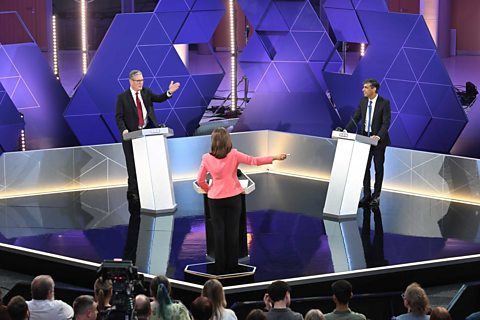 Image source, BBC
Image source, BBCDuring elections, the media hold parties to account by questioning leaders and candidates on their policies and abilities.
Journalists look into each party's manifesto and ask questions about their policies and their ability to deliver on their promises.
Television shows like Question Time and Debate Night, and radio phone-in programmes, can give voters the opportunity to question politicians directly.
 Image source, BBC
Image source, BBCHow does the media influence voters during elections?
While television and radio must remain politically neutral and fair to all parties, newspapers are free to take political sides and to try and influence how their readers vote. They can do this by giving a chosen party more coverage, speaking about them more positively, and by criticising rival parties.
Parties and individuals are free to present their views on election issues on social media, however some social media content may present misinformation.
Social media companies sometimes flag content that could be misleading or fake news, but this does not always happen. Misinformation can spread quickly and may reach many people before social media companies react.
Quiz
Recap what you have learned
Individuals can participate in elections by:
- voting - anyone aged 16 or over can vote in elections to the Scottish Parliament and local councils in Scotland
- staying informed - being aware of issues helps people decide who to vote for
- supporting a candidate - displaying posters, delivering leaflets and canvassing door-to-door
- standing as a candidate - people can stand as a party candidate or independent candidate
Political parties can participate in elections by:
- producing a manifesto - a manifesto outlines policies and plans for government, letting people know what they are voting for
- campaigning - canvassing, leafleting and holding public meetings and events help a party spread its message
- engaging with the media - coverage on TV, radio, social media and newspapers help parties reach the wider public
Media can participate in elections by:
- informing - telling voters about parties and issues, and covering events of the election and campaigns themselves
- holding to account - questioning candidates and parties on their policies and ability to deliver
- influence
- TV and radio must remain neutral
- newspapers and social media can take political sides and attempt to sway how people vote
More on Democracy in Scotland
Find out more by working through a topic
- count9 of 18
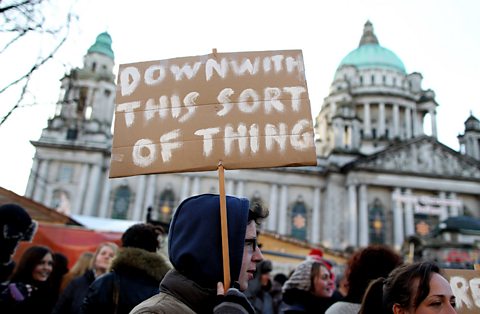
- count10 of 18
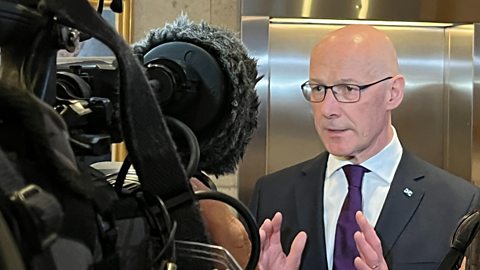
- count11 of 18
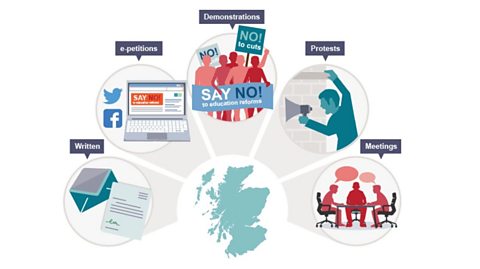
- count12 of 18
